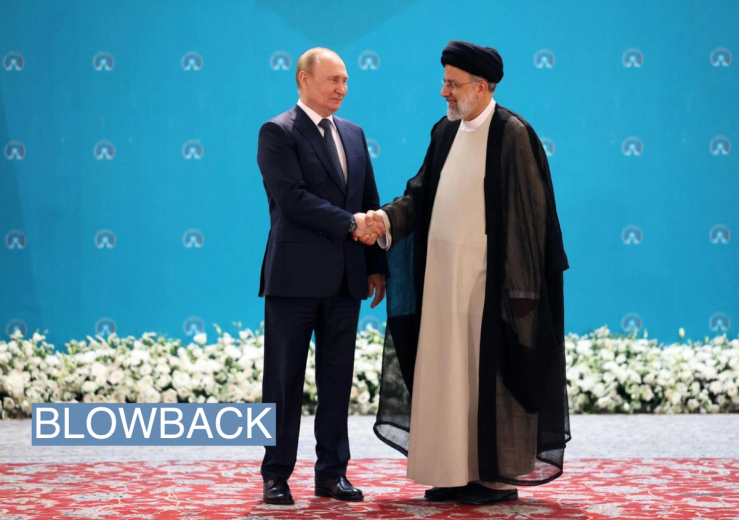The Scoop
Israel and key Gulf states are lobbying Russia not to send advanced military hardware — including helicopters and fighter jets — to Iran, fearing that their strengthening alliance could affect the balance of power in the Middle East.
Officials from Israel, Saudi Arabia, and the United Arab Emirates have directly raised their concerns with Vladimir Putin’s government in recent months, according to Mideast and U.S. officials briefed on the discussions.
Leaders in the three countries are also becoming more broadly concerned with the military know-how Iran is acquiring by helping Russia wage war in Europe, particularly when it comes to executing drone strikes, officials said.
The tensions come after the Saudis, Emiratis, and Israelis have all sought to maintain relatively strong ties with Russia since the war in Ukraine began. The U.S. has accused the Saudis and other Arab oil states of siding with Moscow in the war by agreeing to production cuts, a charge they deny. Israel coordinates with the Russian military before striking Iranian interests in Syria.
Arab diplomats have told Russian officials that supplying Tehran with advanced weapons would not only destabilize the military balance in the Persian Gulf but also place Russia firmly on the side of Iran in a potential conflict, isolating Moscow from its Arab partners. Arab officials say they have asked Russia to at least delay any weapons shipments to Iran if it won’t agree to cancel them outright.
But those briefed on the recent discussions said they’re skeptical Putin can be swayed given his dependence on Iranian aid in a war that is centrally important to Russia.
“I think it will only get worse,” said a senior Arab official briefed on the deliberations. “The Russian-Iranian relationship will only get stronger since they now need each other.”
Spokespeople for Iran and Russia didn’t respond to requests seeking comment.
Jay’s view
Acquiring Russian jets and helicopters could be transformative for Iran’s military, which currently suffers from a depleted air force and a limited ability to source parts and technology due to Western sanctions. It would vastly strengthen Tehran’s ability to operate in theaters like Syria, Iraq, and the Persian Gulf, defense strategists told Semafor.
Norman Roule, who served as the U.S. government’s national intelligence manager for Iran from 2008-2017, said that Iran is also picking up valuable expertise by learning how to orchestrate drone strikes against a conventional military equipped with NATO weapons systems and intelligence.
The conflict could “provide Tehran with important lessons on how to conduct saturation attacks against civilian and military targets that will likely be used against Iran’s neighbors and U.S. forces,” said Roule, referring to tactics designed to overwhelm an adversary’s defenses.
Know More
If Russia does choose to send Iran advanced weapons, it would mark a dramatic new step forward in a military partnership that has already had profound consequences for both the Middle East and Europe. U.S. and Western officials say there’s evidence Iranian pilots have already begun training in Russia on advanced Sukhoi Su-35 fighter jets.
Though adversaries in the past, Tehran and Moscow developed a close relationship over the last decade as they teamed up to counter U.S. interests abroad. The alliance solidified in Syria, where the two countries fused their military operations to support President Bashar al-Assad against rebels, some of whom have received U.S. backing.
Their alliance has been critical to Putin’s war effort in Ukraine. Iran started supplying Russia with one-way kamikaze drones last fall that the Kremlin has used to conduct devastating attacks, including on civilian targets. U.S. and Ukrainian officials say trainers from Iran’s elite military unit, the Islamic Revolutionary Guard Corps, have been deployed in Crimea to assist in the strikes.
Moscow and Tehran already have plans to deepen their partnership. The two countries have begun taking steps to build a drone factory in central Russia, according to officials who’ve seen the intelligence. And they’re building a “transcontinental trade route” to move supplies while evading Western sanctions.
The U.S. and its allies have been closely tracking the movement of Russian and Iranian delegations to one another’s capitals, where some discussions have focused on the future supply of Iranian ballistic missiles to Russia.
Iran is seeking to purchase more advanced weapons systems from Russia in return. Iranian state media has reported that Tehran expects to acquire dozens of the Sukhoi Su-35 fighter jets starting sometime this year, as well as a range of attack helicopters and other weapons. White House national security spokesman John Kirby told reporters late last month the administration would watch “very closely” to see “what, if any, transactions are actually made.”
The View From The Pentagon
The Defense Department says it is already accelerating efforts with allies to track and halt weapons shipments from Iran to Russia, and that they are closely monitoring for the flows of Russian arms back to Iran. A Western official said there’s intelligence showing Russia has shared captured Ukrainian munitions, such as U.S-.supplied Javelin and Stinger missiles, with Iran. Tehran can then re-engineer the weapons, either to better combat them or produce them domestically.
“It is reasonable to expect that the tactics, techniques and procedures that the Iranians are learning and perfecting in Ukraine will one day come back to threaten our partners in the Middle East,” Dana Stroul, the Pentagon’s deputy assistant secretary of state for the Middle East, said in Dubai this month. “We are increasing cooperation now — intelligence-sharing, understanding these networks, and increasing our collective defensive capabilities — so that we are prepared to counter these threats in the region.”
Room for Disagreement
Not all military strategists, even in allied Mideast countries, are as alarmed by the prospects of this Russian-Iranian collaboration. “A dozen jet aircraft does not make an air force — Iran has invested in drones for a reason,” said a February analysis piece in the Jerusalem Post. “Iran’s potential acquisitions in Russia’s flailing aircraft market is more a sign of the weakness of the two countries, than a real gamechanger.”
Notable
- Iran watchers believe there’s a potential that Tehran could deploy military forces in Ukraine made up of conscripts recruited from Shiite populations in Afghanistan, Pakistan and Lebanon. Tehran has already utilized its Fatemiyoun and Zainebiyoun Brigades alongside Russia air power in Syria. These units are seen as adept at using drone and missile technologies in the battlefield.


